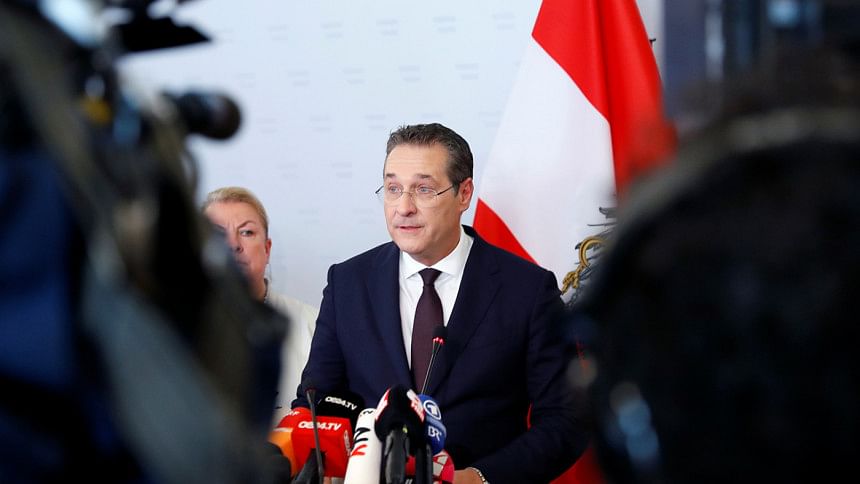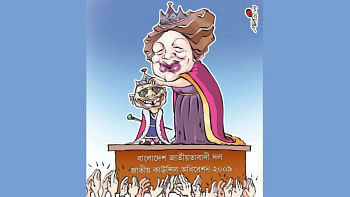Austrian far-right leader resigns over 'Ibiza affair'

Austrian Vice-Chancellor Heinz-Christian Strache, a key figure of the European far-right, resigned Saturday after explosive revelations from a hidden camera sting, just days before key EU elections.
"I tendered my resignation as vice-chancellor of Austria to Chancellor Kurz, and he accepted this decision," an emotional Strache said in a televised statement.
Media reports emerged on Friday alleging that Strache promised public contracts in return for campaign help from a fake Russian backer he met in a luxury villa on the island of Ibiza a few months before 2017's parliamentary elections in Austria.
On Saturday Strache insisted he was the "victim of a targeted political attack" which had used illegal means, but that he was leaving in order to avoid further damage to the government.
Germany's Der Spiegel and Sueddeutsche Zeitung published hidden-camera recordings of the sophisticated sting operation.
In the recordings Strache and his party's group leader in parliament Johann Gudenus are seen discussing with a woman purporting to be the niece of a Russian oligarch how she can invest in Austria.
She says she specifically wants to gain control of the country's largest-circulation tabloid, the Krone Zeitung.
Strache is seen suggesting that new owners could make staff changes at the Krone and use the paper to help his Freedom Party (FPOe) in its election campaign.
He goes on to suggest the woman would then be able to gain access to public contracts.
According the newspapers, Strache says that there would be no resistance among the Krone's editorial staff as "journalists are the biggest whores on the planet".
Both the newspapers that published the footage say they don't have any firm information over who set up the elaborate sting.
'Done for!'
Chancellor Sebastian Kurz was due to give his reaction to the scandal on Saturday, with rumours rife that he may push for early elections.
The Krone Zeitung took a particularly outraged tone in its coverage, with its Saturday edition sporting a banner headline reading "The FPOe is done for!".
The Die Presse newspaper's headline talks of a "coalition on the brink".
The Austrian APA agency reports FPOe party sources as saying they want to try to save the coalition with Kurz's centre-right People's Party (OeVP) by replacing Strache as vice-chancellor with Transport Minister Norbert Hofer, also from the FPOe.
Elsewhere in the video Strache evokes the possibility of privatising part of Austria's public broadcaster ORF and says he would like Austria's media landscape to resemble that of neighbouring Hungary.
Hungary's right-wing nationalist Prime Minister Viktor Orban has overhauled the country's public media into a government propaganda organ while allies have steadily bought up swathes of the private media sector.
The FPOe has mounted repeated attacks on the ORF's coverage, accusing it of being biased against the party.
Strache also appeared to hint at possible ways political donations could be made to a foundation linked to the FPOe and not to the party directly, apparently in order to escape legal scrutiny.
In recent weeks Kurz has already had to defend his decision to enter government with the far-right after a string of revelations about extremist sympathies in the FPOe's ranks.
The putative link to Russia in the scandal is particularly embarrassing as the FPOe has a cooperation agreement with Russian President Vladimir Putin's United Russia party, leading many to accuse the FPOe of an overly close relationship with Moscow.
The FPOe's lead candidate in next week's elections, MEP Harald Vilimsky, cancelled a planned trip to Milan on Saturday where he was due to take part in a campaign event with far-right Italian Interior Minister Matteo Salvini.
Strache, 49, succeeded the mercurial Joerg Haider as leader of the party in 2005.
He himself flirted with neo-Nazism in his youth, but as leader sought to clean up the party's image and make it more electable.

 For all latest news, follow The Daily Star's Google News channel.
For all latest news, follow The Daily Star's Google News channel. 



Comments